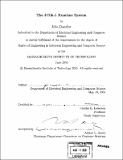The JCilk-1 runtime system
Author(s)
Danaher, John (John Stephen)
DownloadFull printable version (4.479Mb)
Other Contributors
Massachusetts Institute of Technology. Dept. of Electrical Engineering and Computer Science.
Advisor
Charles E. Leiserson.
Terms of use
Metadata
Show full item recordAbstract
JCilk extends the Java language to provide call-return semantics for multithreading, much as Cilk does for C. Java's built-in thread model does not support the passing of exceptions or return values from one thread back to the "parent" thread that created it. JCilk imports Cilk's fork-join primitives spawn and sync into Java to provide procedure-call semantics for concurrent subcomputations. It also introduces exceptions into that fork-join structure, leading to some some surprising semantic synergies. In particular, JCilk extends Java's exception semantics to allow exceptions to be passed from a spawned method to its parent in a natural way that obviates the need for Cilk's inlet and abort constructs. When executing in parallel, an exception thrown by a JCilk computation signals its "side computations" to abort, which yields a clean semantics in which only a single exception from the enclosing try block is handled. Because JCilk uses Java's normal exception mechanism to propagate an abort throughout the side computations, the programmer can handle clean-up by simply catching a thrown CilkAbort exception. (cont.) JCilk supports these features by introducing the concept of a "catchlet" as a mechanism for handling exceptions in a concurrent context. In my work, I have implented a runtime system for JCilk which uses a tree structure to track the dynamic state of nested try blocks. Using this tree, the runtime system is able to signal aborts to the proper side computations and determine when the catch block is able to run. The result is an efficient implementation of the JCilk specification.
Description
Thesis (M. Eng.)--Massachusetts Institute of Technology, Dept. of Electrical Engineering and Computer Science, 2005. Includes bibliographical references (p. 93-97).
Date issued
2005Department
Massachusetts Institute of Technology. Department of Electrical Engineering and Computer SciencePublisher
Massachusetts Institute of Technology
Keywords
Electrical Engineering and Computer Science.